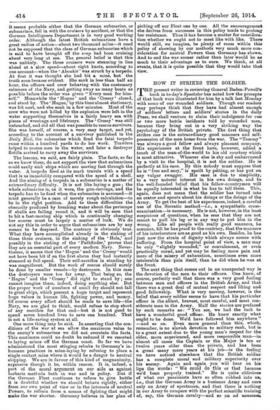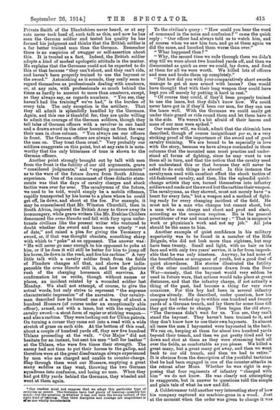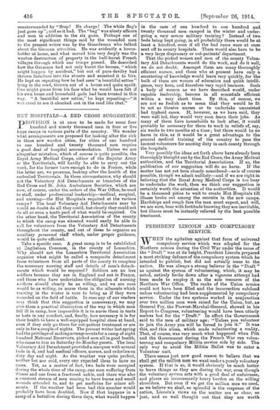HOW IT STRIKES THE SOLDIER.
THE present writer in reviewing General Baden-Powell's book in to-day's Spectator has noted how the precepts of that book were illustrated for him by a talk last Monday with some of our wounded soldiers. Though our readers may perhaps think that they have had almost enough of soldiers' letters and soldiers' stories in the daily Press, we shall venture to claim their indulgence for one or two more battle incidents told by wounded men, because they bring out in a very striking way the psychology of the British private. The first thing that strikes one is the extraordinary good manners and self- possession of the men home from the war. The "Tommy" was always a good fellow and always pleasant company. His experiences at the front have, however, added a touch of the man-of-the-world to his old courtesy which is most attractive. Whoever else is shy and embarrassed by a visit to the hospital, it is not the soldier. He is perfectly at his ease. By this nobody must suppose that he is " free and easy," is spoilt by petting, or has put on any vulgar swagger. His ease is due to simplicity, to a very natural interest in his own doings, and to the well-founded belief that his fellow-countrymen will be equally interested in what he has to tell them. This, again, does not mean that the soldier has turned into an orator and spouts about his doings or the doings of the Army. To get the best of his experiences, indeed, a careful use of the Socratic method—i.e., a sympathetic cross- examination—is necessary. He is not, however, in the least suspicious of questions, when he sees that they are not meant to pull his leg or in any way to put him in the wrong. Like all people with really good manners, he assumes, till he has proof to the contrary, that the manners of his interlocutors are as good as his own. Besides, lie has just now the strain of dignity which always comes with suffering. From the hospital point of view, a man may be only "slightly wounded," or convalescent, or even practically cured, and yet may be feeling more pain and more of the misery of exhaustion, sometimes even more intolerable than pain itself, than he did when he was at the front.
The next thing that comes out in an unexpected way is the devotion of the men to their officers. One knew, of course, perfectly well that there was a very good feeling between men and officers in the British Army, and that there was a great deal of mutual respect and liking and good fellowship. What is very moving, however, is the belief that every soldier seems to have that his particular officer is the ablest, bravest, most careful, and most con- siderate man in the Army. Half the stories are'prefaced by such remarks as: " You see, we had the luck to have a wonderful good officer. He knew exactly what ought to be done. We'd have followed him anywhere " —and so on. Even more general than this, which, remember, is no slavish devotion to military rank, but is to a great extent due to the young man's respect for the older, more experienced, and more responsible man—in almost all cases the Captain or the Major is ten or twelve years older than the private, and has been a great many more years at his job—is the feeling we have noticed elsewhere that the British soldier has a complete moral and military superiority over his enemy. Again and again you will hear on his lips the words: " We could do this or that because we'd been properly trained." He is quite oblivious of what our pessimists have so often rubbed into us, i.e., that the German Army is a business Army and ours only an Army of sportsmen, and that there is nothing in our Army to compare with the perfect scientific training of, say, the German cavalry—and so on ad nauseant, Private Smith of the Blaukshires never heard, or at any rate never took heed of, such talk as this, and now he has seen the German soldier and tested his quality he has formed his judgment and thinks that the British soldier is a far better trained man than the German. Remember there is no suspicion of swagger or self-assertion about this. It is treated as a fact. Indeed, the British soldier adopts a kind of modest apologetic attitude in the matter. He explains that the Germans could not be expected to do this or that because " they can't shoot, and they can't ride, and haven't been properly trained to use the bayonet or the sword." Astonishing as it sounds, they really seem to regard themselves as professionals dealing with amateurs, or, at any rate, with professionals so much behind the times as hardly to amount to more than amateurs, except, as they always say, as regards numbers. " You see, they haven't had the training* we've had," is the burden of every tale. The only exception is the artillery. That they all admit is splendidly handled by the Germans. Again, and this one is thankful for, they are quite willing to admit the courage of the German soldiers, though they tell tales of German officers with a revolver in one band and a drawn sword in the other bounding on from the rear their men in close column. " You always see our officers in front. The German officers are always behind, forging the men on. They treat them cruel." Very probably our soldiers exaggerate on this point, but at any rate it is note- worthy that the only bitterness of tone is shown to the German officers.
Another point strongly brought out by talk with men from the front is the futility of our old arguments, grave "considered judgments," and "expert pronouncements" as to the wars of the future drawn from South African experience. One of the commonest of these didactic state- ments was that the days of cavalry charges and shock tactics were over for ever. The cavalryman of the future, we used to be told, would simply be a mobile rifleman, rapidly transported by his horse to a place where he could get off, lie down, and shoot at the foe. For example, it may be remembered that Mr. Winston Churchill, then in South Africa, implored the British Army to throw away its ironmongery, while grave writers like Mr. Erskine Childers denounced the arme blanche and fell with fury upon unfor- tunate civilians like the present writer who ventured to doubt whether the sword and lance were utterly " out of date," and raised a plea for giving the Yeomanry a sword, or, if that was thought obsolete, something sharp with which to " poke" at an opponent. The answer was : " He will never go near enough to his opponent to poke at him, or if he does it will still be better for him to jump off his horse, lie down in the road, and fire his carbine." A very little talk with a cavalry soldier fresh from the fields of Flanders changes all that, and shows how indis- pensable the arme blanche still is, and how the glorious rush of the charging horsemen still survives. As confirmation let us recite, though without names or places, an incident related by a wounded soldier last Monday. We shall not attempt, of course, to give the actual words, but only strive to represent " the supreme characteristic impression " of the narrative. Our cavalry- man described how he formed one of a troop of about a hundred Hussars (of course under an exceptionally able officer), armed, not with a lance, but with the regulation cavalry sword—a stout form of rapier or sticking weapon— and also a carbine. They were looking out for Uhlan patrols. On turning a corner they came out into a road with a wide stretch of grass on each side. At the bottom of this road, about a couple of hundred yards off, they saw five hundred Inalans proceeding at the walk. " Our Major " did not hesitate for an instant, but sent his men " hell for leather " at the Uhlans, who were five times their strength. The enemy had not time to put their horses to the gallop, and therefore were at the great disadvantage always experienced by men who are charged and unable to counter-charge. Slap through them went our Hussars, emptying a great many saddles as they went, throwing the two German squadrons into confusion, and losing no men. When they had got fifty yards behind the Germans, they wheeled and went at them again.
Our readers must not suppose that we adopt this particular type of criticism as sound. The Germans have had plenty of training—possibly too much—but the question is whether it has not been the wrong instead of the right kind of training. That their discipline and courage are magnificent is
ot irse wholly incontastabls
To the civilian's query : " How could you hear the word of command in the noise and confusion ? ' came the quick reply : " Our officer had always told us to watch him, and of course when we saw him tun. and go at them again we did the same, and knocked them worse than ever."
" What happened then ? "
" Why, the second time we rode through them we didn't stop till we were about two hundred yards off, and then we dismounted as quick as ever we could, lay down, and fired at them for all we were worth. We killed lots of officers and men and broke them up completely."
" But how did you with your comparatively short swords manage to get at men armed with lances ? One would have thought that with their long weapon they could have kept you off merely by putting it hard in rest."
" Of course they could, if they'd been properly trained to use the lance, but they didn't know how. We could never have got in if they'd been our men, for they can use the lance well. With the Germans we could easily get under their guard or ride round them and let them have it in the side. We weren't a bit afraid of their lances and none of our men were spiked."
Our readers will, we think, admit that the skirmish here described, though of course insignificant per se, is a very striking proof of the importance of the sword and of good cavalry training. We are bound to be especially in love with the story, because we have always contended in these columns that the mounted man must practise and under- stand all forms of fighting, since he may want to use them all in turn, and that the notion that the cavalry need not understand this or that because they will never be asked to do such things is absurd. In this instance the cavalrymen used with excellent effect the shock tactics of old-fashioned cavalry, and then, like the splendid quick- change artists they are, turned themselves into infantry soldiers and made not the sword but the carbine their weapon.
The cavalryman, as they showed, must not merely have " a heart for every fate," but a weapon and a method of fight- ing ready for every changing incident of the field. He must not be a man who charges but cannot shoot, but a man who can charge and shoot and prod and slash, according as the occasion requires. He is the general practitioner of war and must never say : " That is surgeon's work or physician's work and not my job." All jobs should be the same to him.
Another example of quiet confidence in his military superiority was to be found in a member of the Rifle Brigade, who did not look more than eighteen, but may have been twenty. Small and light, with no hair on his face and with only two years' service, it is far from improb- able that he was only nineteen. Anyway, he bad none of the boastfulness or arrogance of youth, but a good deal of quiet shrewdness. His stories illustrated the futility of the other confident assurance drawn from the Boer War—namely, that the bayonet would very seldom be used in future wars, that actions would take place at great distances, and that the infantry charge, if not actually a thing of the past, had become a thing for very rare occasions. For this boy had been in several infantry charges already. He described, under question, how his company had worked up to within one hundred and twenty yards of a German trench, and lay there for some time till they got the order to charge. Then began the old story. " The Germans didn't wait for us. You see, they can't stand the bayonet. They haven't been trained to it, and they don't know how to use their own bayonets. In almost all cases the men I bayoneted were bayoneted in the back. We ran on, keeping at them for about two hundred yards beyond their trench, and then we got pretty tired and lay down and shot at them as they were streaming back all over the fields, as comfortable as you please. We killed a great many, but a great many got away, and then we went back to our old trench, and then we had to retire." It is obvious from the description of the youthful tactician that he had been engaged in one of the counter-attacks in the retreat after Mons. Whether he was right in sup- posing that four regiments of infantry " charged with him ' we do not know. He was clearly not attempting to exaggerate, but in answer to questions told the simple and plain tale of what he saw and did.
A Coldstreamer told another very interesting story of bow his company captured six machine-guns in a wood. Just at the moment when the order was given to charge it was countermanded by "Stop! No charge! The white flag's just gone up"; and so it had. The "bag" was ninety officers and men in addition to the six guns. Perhaps one of the most significant things said by the wounded men to the present writer was by the Guardsman who talked about the German atrocities. He was evidently a house- holder at home, and what moved him very deeply was the wanton destruction of property in the half-burnt French villages through which our troops passed. He described how the Germans had not only burnt the houses, "which might happen by accident," but out of pure devilry had thrown furniture into the streets and smashed it to bits. He kept on repeating how he had seen" a beautiful settee" lying in the road, thrown out of a house and quite spoilt. One might guess from his face what he would have felt if his own home and household gods had been treated in this way. " A beautiful new settee," he kept repeating—" it was cruel to see it chucked out in the road like that,"




































 Previous page
Previous page